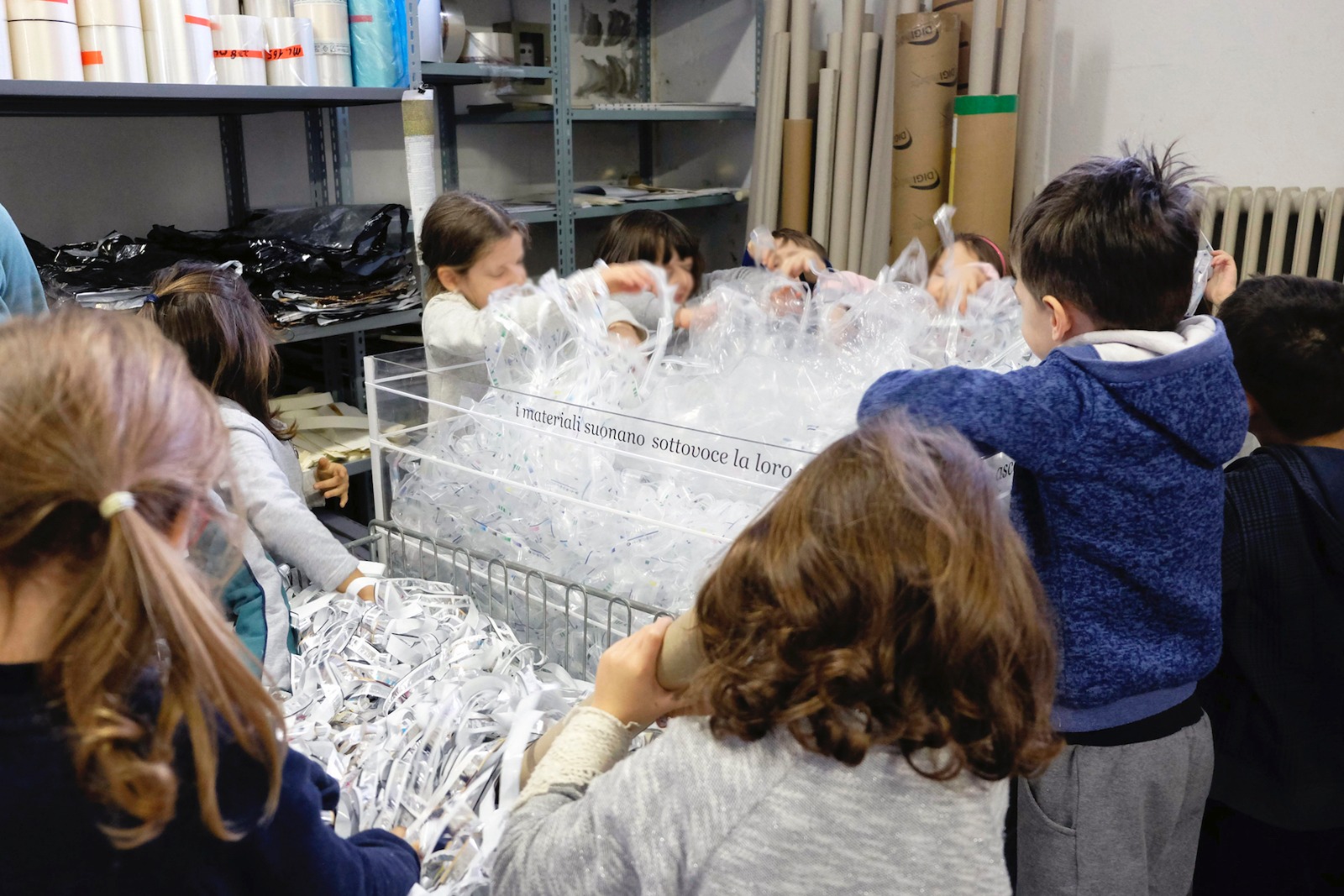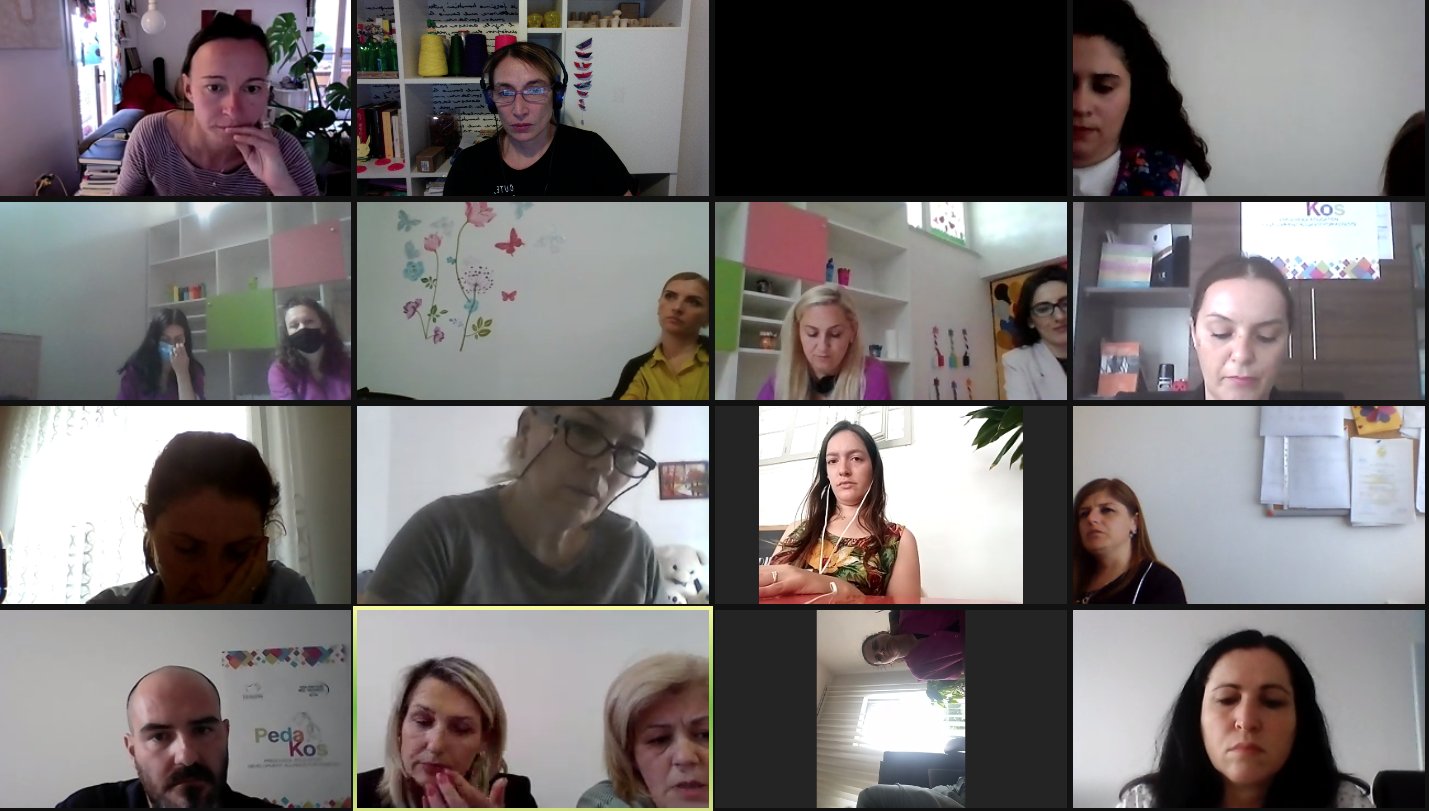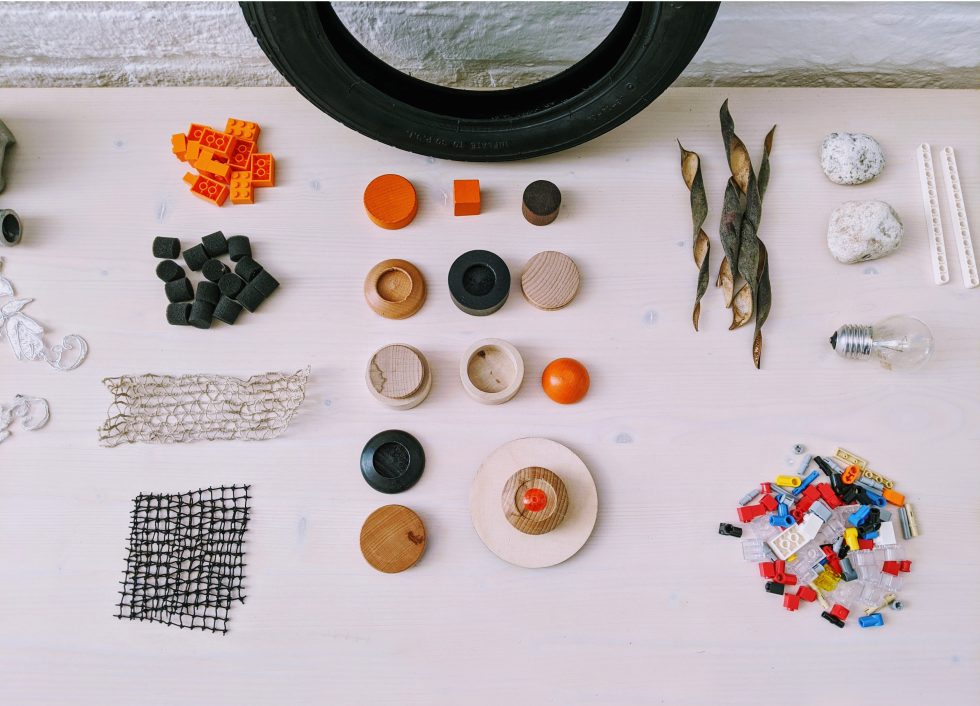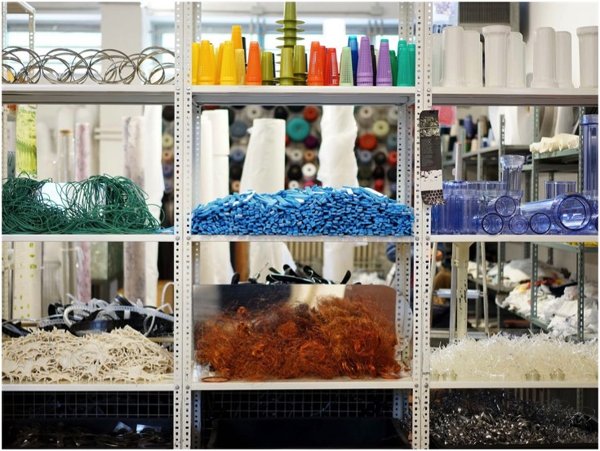Kosovo and early childhood: thinking with your hands
Reusing recycled materials in early childhood education: the Creative Recycling Center of Reggio Emilia has recently proposed some workshops to educators from Kosovo. We talked about it with organisational coordinator Laura Pedroni

Kosovo-e-prima-infanzia-pensare-con-le-mani
Children explore materials at the Remida Creative Recycling Center - © Remida
A few weeks ago a training cycle on the recovery and reuse of waste material for educational purposes was completed which involved educators from Kosovo in the sector 0-6 years. Can you tell us what it was all about?
This training course is part of the Pedakos project, promoted by Volontari nel Mondo-RTM. The general objective is to increase the quality of educational services offered by public, private, and community preschools in Kosovo. To do this, a pilot group of 15 preschools spread across all regions of the country was involved.
The role of the Reggio Children Foundation in the framework of the project includes support and consultancy for the implementation of initiatives aimed at promoting taste education (thanks to the collaboration with PAUSE Atelier dei Sapori) and the reuse of materials (thanks to the experience of Remida, the Creative Recycling Center of Reggio Emilia promoted together with Reggio Emilia Institution for Preschools and Infant-toddler Centres and Iren).
In particular, the recent online course, divided into four meetings between the end of April and June, had the aim of raising awareness of the theme of reusing materials, promoting the idea that informal, unstructured, discarded material can be an educational and cultural resource, enrich everyday school contexts, and offer unusual ideas and suggestions for working with children.
One way, among other things, to bring schools closer to sustainability. We are indeed convinced that today this is a more urgent issue than ever. Our idea of sustainability is reflected in the vision offered by the 17 Sustainable Development Goals of the United Nations 2030 Agenda, which emphasise the need for a multidisciplinary approach, an integrated vision of the different dimensions of sustainable development, starting from quality education.
We believe, today more than ever, also in sustainability of relationships, a social and economic sustainability. We believe in the right to non-compliance, in the right to imperfection. What is considered "waste", non-compliant, has many possibilities for us, it has value, it becomes precious.
One of the phrases that inspire you is “Thinking with your hands”. What does it mean?
Remida promotes the idea that the materials that companies discard (new, never used, but destined for disposal for various reasons) have great educational potential and cultural value. The goal is – through research work and adopting an unusual, "oblique" gaze – to find beauty where we are not used to looking for it, that is, in unstructured materials. And, to see the many identities and possibilities, the materials must be explored, manipulated, investigated: with the hands, with sight, with hearing… This is one of the meanings of "thinking with your hands": workshops, ateliers, and research activate cognitive, creative, and relational abilities at all ages.
To bring the schools involved in the project closer to these issues, we had planned a visit to Remida in 2020 and two missions in Kosovo for the training of school staff on the subject. The pandemic has changed our plans a bit and we have had to reshape some actions. The activities planned as part of the project have not only been moved online, but have been completely redesigned with the aim of better responding to the needs of the project, offering ad hoc virtual meetings with and for schools.
Kosovo is a country that in recent decades has experienced conflicts, emigration, and – for a significant part of those who live there – severe poverty. In this context, what emerged from the participants regarding the theme of recycling?
During the training course, in which we met several teachers and administrators of public and private schools in Kosovo, it emerged that currently there is a low propensity of local communities to protect the environment, for the sustainable use of resources, reuse and recycling. However, we have noticed that the topic has aroused a lot of interest and that awareness is growing of how important it is to do something to reverse this trend.
The schools involved have in fact shown that they want to activate paths and projects that can promote (not only in educational activities, but also involving communities and families) a greater sensitivity towards sustainable development issues.
Another peculiarity that emerged is that well-known teaching materials are very present in schools, while it is not so common to work with children with informal, unstructured, discarded materials. Even in this case, however, teachers, directors, and administrators of the schools pushed on and enthusiastically participated in the discussion, then proposing to the children some of the projects we talked about along the way.
Can you give us some examples of the activities that can be offered to children?
We proposed the 15 pilot schools two projects inspired by Remida’s activities, on which they could work with children.
A "Paper workshop" where paper is understood not as a material for making a product, but as a subject of research. Children and teenagers are invited to set up their own laboratory with tools and reagents, to discover the anatomical soul of paper, its infinite possibilities to transform itself, to become plastic, to retain the memory of gestures and time. A proposal that activates scientific, narrative, technological, and creative skills.
And then a second workshop titled "Fantastic Bicycles" with which we call children and teachers to work together on imagination and composition, to design "fantastic bicycles" starting from unusual objects, informal materials, and images. This type of activity promotes collaboration and sharing, and invites adults to reflect together with even small children on the idea of movement, balance, courage, autonomy, and the meaning of their growth day by day.
What are the most notable elements that emerged from this training cycle in Kosovo?
Despite the many difficulties in schools, aggravated in recent months also by the pandemic emergency, we were struck by the involvement and participation of schools in the meetings and activities proposed, the desire to have ideas and suggestions to be able to develop in their daily activities.
We also found it very interesting that the school representatives expressed the desire to continue with this type of in-depth study, as they were considered innovative, unusual compared to their usual way of working, more focused on traditional teaching activities. The 15 pilot schools, although very different from each other – both from a managerial and organisational point of view – actively participated in all the meetings and asked many questions.
In your activity in Italy you often meet educators and teachers. Have you noticed any particular differences or similarities in approach compared to your colleagues in Kosovo?
Without directly intervening on educational approaches, teaching activities, and pedagogical choices, what we try to share when we come into contact with different experiences is an educational approach based on the protection and promotion of the rights and potential of children and on co-responsibility among sector players. In doing so, it is essential to defend and promote the rights of children, starting from the idea of a competent child as subject of rights. A child to listen to, value, and involve in educational processes. It is therefore important to focus on the training of teaching staff and on good daily practices, as required by the activities and paths offered by various institutions within the Pedakos project – which enjoys the collaboration of valuable local partners, including the Ministry of Education, and in Reggio Emilia with the involvement of the Reggio Emilia Institution for Preschools and Infant-toddler Centres.
It is in fact essential to highlight the issue of early childhood education in Kosovo, a topic that for many years has not been considered a priority either by local actors or by the international community. RTM has therefore started to work in this direction and the Pedakos project is part of this path.
Over the years a network of other Remida centers has been created which today counts 12 realities in Italy and in the world, for example in Argentina, Australia, Sweden. How did these international collaborations come about and do you think there is room for such activities in the Balkans as well?
The interest aroused in these 25 years by the Remida project and the dialogues established over years of welcome and study visits have generated a network that today consists of 13 Remida centres, 8 in Italy and 5 in the world, that are geographically distant, but close in their ideas and approach.
All together they participate in enhancing creative recycling and environmental protection, planning shared cultural, environmental, and educational initiatives, activating collaborations between the world of education and companies.
However, each centre in the network has a specific DNA. Not only from from a managerial and organisational point of view – not all centres offer the same activities and management models are very different – but also because each Remida speaks of the territory in which it is located: of its companies and its materials; relations between the world of business, school, and culture; of the requests and needs that each territory and its citizens express.
For this reason, there are no places that are not suitable for projects of this type, as it is important that each centre can interpret and give voice to the context it inhabits. And this is also true in the case of the Balkans: raising awareness on sustainable development, the conscious use of resources, and the regenerative possibilities of what is considered waste is a universal value.
Tag: Pedakos
Featured articles
- Take part in the survey
Kosovo and early childhood: thinking with your hands
Reusing recycled materials in early childhood education: the Creative Recycling Center of Reggio Emilia has recently proposed some workshops to educators from Kosovo. We talked about it with organisational coordinator Laura Pedroni

Kosovo-e-prima-infanzia-pensare-con-le-mani
Children explore materials at the Remida Creative Recycling Center - © Remida
A few weeks ago a training cycle on the recovery and reuse of waste material for educational purposes was completed which involved educators from Kosovo in the sector 0-6 years. Can you tell us what it was all about?
This training course is part of the Pedakos project, promoted by Volontari nel Mondo-RTM. The general objective is to increase the quality of educational services offered by public, private, and community preschools in Kosovo. To do this, a pilot group of 15 preschools spread across all regions of the country was involved.
The role of the Reggio Children Foundation in the framework of the project includes support and consultancy for the implementation of initiatives aimed at promoting taste education (thanks to the collaboration with PAUSE Atelier dei Sapori) and the reuse of materials (thanks to the experience of Remida, the Creative Recycling Center of Reggio Emilia promoted together with Reggio Emilia Institution for Preschools and Infant-toddler Centres and Iren).
In particular, the recent online course, divided into four meetings between the end of April and June, had the aim of raising awareness of the theme of reusing materials, promoting the idea that informal, unstructured, discarded material can be an educational and cultural resource, enrich everyday school contexts, and offer unusual ideas and suggestions for working with children.
One way, among other things, to bring schools closer to sustainability. We are indeed convinced that today this is a more urgent issue than ever. Our idea of sustainability is reflected in the vision offered by the 17 Sustainable Development Goals of the United Nations 2030 Agenda, which emphasise the need for a multidisciplinary approach, an integrated vision of the different dimensions of sustainable development, starting from quality education.
We believe, today more than ever, also in sustainability of relationships, a social and economic sustainability. We believe in the right to non-compliance, in the right to imperfection. What is considered "waste", non-compliant, has many possibilities for us, it has value, it becomes precious.
One of the phrases that inspire you is “Thinking with your hands”. What does it mean?
Remida promotes the idea that the materials that companies discard (new, never used, but destined for disposal for various reasons) have great educational potential and cultural value. The goal is – through research work and adopting an unusual, "oblique" gaze – to find beauty where we are not used to looking for it, that is, in unstructured materials. And, to see the many identities and possibilities, the materials must be explored, manipulated, investigated: with the hands, with sight, with hearing… This is one of the meanings of "thinking with your hands": workshops, ateliers, and research activate cognitive, creative, and relational abilities at all ages.
To bring the schools involved in the project closer to these issues, we had planned a visit to Remida in 2020 and two missions in Kosovo for the training of school staff on the subject. The pandemic has changed our plans a bit and we have had to reshape some actions. The activities planned as part of the project have not only been moved online, but have been completely redesigned with the aim of better responding to the needs of the project, offering ad hoc virtual meetings with and for schools.
Kosovo is a country that in recent decades has experienced conflicts, emigration, and – for a significant part of those who live there – severe poverty. In this context, what emerged from the participants regarding the theme of recycling?
During the training course, in which we met several teachers and administrators of public and private schools in Kosovo, it emerged that currently there is a low propensity of local communities to protect the environment, for the sustainable use of resources, reuse and recycling. However, we have noticed that the topic has aroused a lot of interest and that awareness is growing of how important it is to do something to reverse this trend.
The schools involved have in fact shown that they want to activate paths and projects that can promote (not only in educational activities, but also involving communities and families) a greater sensitivity towards sustainable development issues.
Another peculiarity that emerged is that well-known teaching materials are very present in schools, while it is not so common to work with children with informal, unstructured, discarded materials. Even in this case, however, teachers, directors, and administrators of the schools pushed on and enthusiastically participated in the discussion, then proposing to the children some of the projects we talked about along the way.
Can you give us some examples of the activities that can be offered to children?
We proposed the 15 pilot schools two projects inspired by Remida’s activities, on which they could work with children.
A "Paper workshop" where paper is understood not as a material for making a product, but as a subject of research. Children and teenagers are invited to set up their own laboratory with tools and reagents, to discover the anatomical soul of paper, its infinite possibilities to transform itself, to become plastic, to retain the memory of gestures and time. A proposal that activates scientific, narrative, technological, and creative skills.
And then a second workshop titled "Fantastic Bicycles" with which we call children and teachers to work together on imagination and composition, to design "fantastic bicycles" starting from unusual objects, informal materials, and images. This type of activity promotes collaboration and sharing, and invites adults to reflect together with even small children on the idea of movement, balance, courage, autonomy, and the meaning of their growth day by day.
What are the most notable elements that emerged from this training cycle in Kosovo?
Despite the many difficulties in schools, aggravated in recent months also by the pandemic emergency, we were struck by the involvement and participation of schools in the meetings and activities proposed, the desire to have ideas and suggestions to be able to develop in their daily activities.
We also found it very interesting that the school representatives expressed the desire to continue with this type of in-depth study, as they were considered innovative, unusual compared to their usual way of working, more focused on traditional teaching activities. The 15 pilot schools, although very different from each other – both from a managerial and organisational point of view – actively participated in all the meetings and asked many questions.
In your activity in Italy you often meet educators and teachers. Have you noticed any particular differences or similarities in approach compared to your colleagues in Kosovo?
Without directly intervening on educational approaches, teaching activities, and pedagogical choices, what we try to share when we come into contact with different experiences is an educational approach based on the protection and promotion of the rights and potential of children and on co-responsibility among sector players. In doing so, it is essential to defend and promote the rights of children, starting from the idea of a competent child as subject of rights. A child to listen to, value, and involve in educational processes. It is therefore important to focus on the training of teaching staff and on good daily practices, as required by the activities and paths offered by various institutions within the Pedakos project – which enjoys the collaboration of valuable local partners, including the Ministry of Education, and in Reggio Emilia with the involvement of the Reggio Emilia Institution for Preschools and Infant-toddler Centres.
It is in fact essential to highlight the issue of early childhood education in Kosovo, a topic that for many years has not been considered a priority either by local actors or by the international community. RTM has therefore started to work in this direction and the Pedakos project is part of this path.
Over the years a network of other Remida centers has been created which today counts 12 realities in Italy and in the world, for example in Argentina, Australia, Sweden. How did these international collaborations come about and do you think there is room for such activities in the Balkans as well?
The interest aroused in these 25 years by the Remida project and the dialogues established over years of welcome and study visits have generated a network that today consists of 13 Remida centres, 8 in Italy and 5 in the world, that are geographically distant, but close in their ideas and approach.
All together they participate in enhancing creative recycling and environmental protection, planning shared cultural, environmental, and educational initiatives, activating collaborations between the world of education and companies.
However, each centre in the network has a specific DNA. Not only from from a managerial and organisational point of view – not all centres offer the same activities and management models are very different – but also because each Remida speaks of the territory in which it is located: of its companies and its materials; relations between the world of business, school, and culture; of the requests and needs that each territory and its citizens express.
For this reason, there are no places that are not suitable for projects of this type, as it is important that each centre can interpret and give voice to the context it inhabits. And this is also true in the case of the Balkans: raising awareness on sustainable development, the conscious use of resources, and the regenerative possibilities of what is considered waste is a universal value.
Tag: Pedakos













